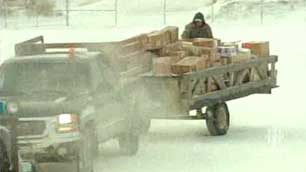Canada's Nutrition North Program Raises Concerns for Small Business
 Some in Canada’s North are worried about the federal government’s new food subsidy program, now known as Nutrition North, and how it will affect the price of groceries in communities.
Some in Canada’s North are worried about the federal government’s new food subsidy program, now known as Nutrition North, and how it will affect the price of groceries in communities.
In the eastern Arctic, the Baffin Regional Chamber of Commerce in Iqaluit says the Nutrition North Program will favour large retailers and hurt small businesses.
Nutrition North replaces the the federal government’s existing Food Mail Program, which subsidized the costs of transporting grocery items to remote northern communities that are cut off from regular road and water access.
Under the old program, businesses and consumers paid a fixed price for subsidized groceries, while the federal Indian and Northern Affairs Department covered the difference on variable costs such as air shipping.
The new Nutrition North subsidy will go to retailers, which in turn will negotiate their own freight agreements, including rates, with airlines.
But Hal Timar, executive director of the Baffin Regional Chamber of Commerce, said the new arrangement will hurt smaller stores like DJ Specialties in Iqaluit, which ships less weight than larger retailers like the local NorthMart.
“There was a time [when] the cheapest place in town to get milk was in the smaller stores,” Timar told CBC News on Tuesday.
“They’re going to be struggling to match the price of the bigger stores, let alone give a better price.”
Market realities
Leo Doyle, acting director of the Nutrition North Program, said cheaper freight costs for big retailers is a market reality.
“Where there may have been a distortion of the market would have been under the food mail program, but that distortion is being eliminated,” Doyle said.
Timar said he also worries that retailers will be able to negotiate shipping terms, which means food orders from small businesses or individuals will no longer have equal priority.
“They might bump other products because it’s no longer considered food mail, it’s just freight,” he said.
About 85 per cent of northern groceries under the Food Mail Program flow through large northern retailers like Northern Stores, NorthMarts and Co-Ops, according to the federal department.
People in Nunavut and the Nunavik region of northern Quebec have expressed their own concerns about the Nutrition North Program, namely that items such as diapers, toilet paper and bottled water are no longer subsidized.
As Nutrition North focuses on subsidizing the costs of healthy, perishable food, it no longer applies to other items such as garlic bread, ice cream, salt, rice, canned vegetables or dried beans.
The dollar value of the Nutrition North subsidy is expected to be announced early next month.
Yukon community seeks exemption
Meanwhile, in the western Arctic, the MLA in the northern Yukon community of Old Crow said he is worried about lesser-quality food and inflated prices once the food subsidy is given to retailers.
Liberal MLA Darius Elias said his constituents found the old Food Mail Program easy to use, since people could order their own groceries from stores in Whitehorse.
“They pick and choose the fruits and vegetables and meats and milks and bread and eggs from where they want to,” Elias said. “It doesn’t say that you can only shop at one store.”
Under Nutrition North, the subsidy will be given to local grocers. In the case of Old Crow, it would likely go to the local Northern Store.
But Doyle said program officials will be meeting with retailers in Whitehorse to see if they are interested in taking part in the program.
“We’re confident that we can work with retailers in Whitehorse and find a solution that is fair and equitable to the people of Old Crow,” Doyle said.
But in a letter to Indian and Northern Affairs Minister John Duncan, Elias has asked for Old Crow to be exempt from the Nutrition North program.
“Any other way, painting Old Crow with the same brush as the rest of Canada is unacceptable,” Elias said. “We’re unique here and we require a unique solution to this issue.”
Elias’s letter is co-signed by Yukon Premier Dennis Fentie and outgoing Vuntut Gwitchin First Nation Chief Joe Linklater.
Nutrition North officials will be travelling to Old Crow next week to talk with citizens about the program changes.



